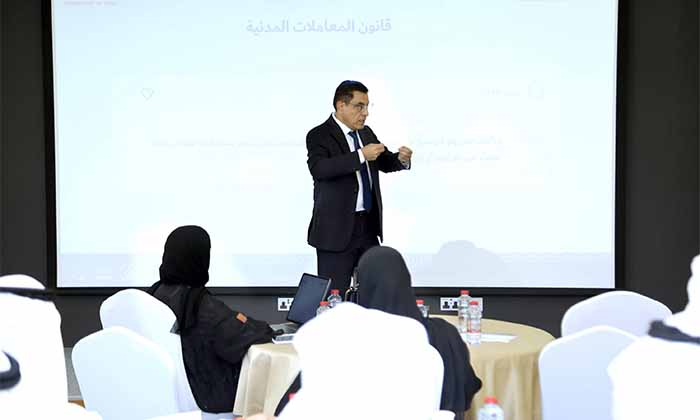SLC sheds light on common linguistic errors in Arabic legislative drafting
The General Secretariat of the Supreme Legislation Committee (SLC) conducted an educational workshop titled ‘Common Linguistic Errors in Arabic Legislative Drafting’ to highlight the significance of mastering language skills for legislative drafting. The workshop shed light on common language errors that are frequently committed, discussing methods to address them and elevate the quality of legislative drafting.
The workshop, led by Salem Ibrahim Al-Ahmad, Head of the Research and Publication Section at the Legislative Awareness Directorate, targeted Dubai government legal professionals specialised in preparing and drafting legislation. During the workshop, various errors commonly committed in legislative drafting were presented and discussed, particularly in the titles and provisions of legislation. These included grammar, spelling, typing, diacritics, and formatting errors, as well as errors made during copying and pasting text. Furthermore, the workshop emphasised the significance of maintaining linguistic accuracy to ensure the cohesion and coherence of legislative provisions.
Commenting on the workshop, SLC Secretary-General Ahmad Saeed bin Meshar Al Muhairi said: “We are delighted to provide the necessary resources and tools to improve flexibility and coherence of legislative provisions. Moreover, we remain committed to hosting forums that shed light on the challenges impeding legislative processes and propose solutions to address them. This awareness workshop aligns perfectly with our ongoing efforts to underscore the relevance of linguistic precision and clarity in legislative provisions. By doing so, we aim to improve understanding of the legislative intent imparted within the text, ensure proper implementation of legislative provisions and regulatory frameworks, and ultimately promote compliance with the legislation.”
During the workshop, Al-Ahmad emphasised the correlation between linguistic precision and the clarity of legislative provisions. He emphasised the importance of mastering the Arabic language skills to elevate the quality of linguistic expression, thereby preventing language errors in legislative provisions. Furthermore, Al-Ahmad elucidated how language errors may introduce ambiguity in the comprehension of judgments and legal provisions and raise the risks of misinterpreting legislative provisions, which in turn increases the possibility of errors in implementation.
Al Ahmad further highlighted the intricate relationship between language and legislation. He pointed out that language serves as an essential tool for legislators to articulate their perspectives and ideas, and that legislators must attain a high level of proficiency to prevent ambiguity in legislative provisions. Moreover, Al Ahmad presented and discussed several common errors and explained strategies to avoid these and improve the quality of legislative drafting.


Comments are closed.